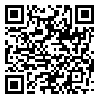دوشنبه 26 آبان 1404
[Archive]
دوره 6، شماره 1 - ( Winter 2018- 1396 )
جلد 6 شماره 1 صفحات 28-21 |
برگشت به فهرست نسخه ها
Download citation:
BibTeX | RIS | EndNote | Medlars | ProCite | Reference Manager | RefWorks
Send citation to:



BibTeX | RIS | EndNote | Medlars | ProCite | Reference Manager | RefWorks
Send citation to:
Ansari N, Shakiba S, Ebrahimzadeh Mousavi M, Mohammadkhani P, Aminoroaya S, Sabzainpoor N. Role of Emotional Dysregulation and Childhood Trauma in Emotional Eating Behavior. PCP 2018; 6 (1) :21-28
URL: http://jpcp.uswr.ac.ir/article-1-482-fa.html
URL: http://jpcp.uswr.ac.ir/article-1-482-fa.html
انصاری نگین، شکیبا شیما، ابراهیم زاده موسوی محمد، محمدخانی پروانه، امین الرعایا یمینی سارا، سبزیان پور ناصر. Role of Emotional Dysregulation and Childhood Trauma in Emotional Eating Behavior. Practice in Clinical Psychology. 1396; 6 (1) :21-28
نگین انصاری*1 
 ، شیما شکیبا2
، شیما شکیبا2 
 ، محمد ابراهیم زاده موسوی2
، محمد ابراهیم زاده موسوی2 
 ، پروانه محمدخانی3
، پروانه محمدخانی3 
 ، سارا امین الرعایا یمینی4
، سارا امین الرعایا یمینی4 
 ، ناصر سبزیان پور5
، ناصر سبزیان پور5 


 ، شیما شکیبا2
، شیما شکیبا2 
 ، محمد ابراهیم زاده موسوی2
، محمد ابراهیم زاده موسوی2 
 ، پروانه محمدخانی3
، پروانه محمدخانی3 
 ، سارا امین الرعایا یمینی4
، سارا امین الرعایا یمینی4 
 ، ناصر سبزیان پور5
، ناصر سبزیان پور5 

1- کارشناس ارشد روانشناسی بالینی، گروه روانشناسی بالینی، دانشکده علوم رفتاری، دانشگاه علوم بهزیستی و توانبخشی تهران، ایران ، negin_ansari@ymail.com
2- کارشناس ارشد روانشناسی بالینی، گروه روانشناسی بالینی، دانشکده علوم رفتاری، دانشگاه علوم بهزیستی و توانبخشی تهران، ایران
3- دکترای روانشناسی بالینی، گروه روانشناسی بالینی، دانشکده علوم رفتاری، دانشگاه علوم بهزیستی و توانبخشی تهران، ایران
4- کارشناس ارشد روانشناسی بالینی
5- کارشناس ارشد روانشناسی بالینی، گروه روانشناسی بالینی، دانشکده علوم رفتاری، دانشگاه علامه ،تهران، ایران
2- کارشناس ارشد روانشناسی بالینی، گروه روانشناسی بالینی، دانشکده علوم رفتاری، دانشگاه علوم بهزیستی و توانبخشی تهران، ایران
3- دکترای روانشناسی بالینی، گروه روانشناسی بالینی، دانشکده علوم رفتاری، دانشگاه علوم بهزیستی و توانبخشی تهران، ایران
4- کارشناس ارشد روانشناسی بالینی
5- کارشناس ارشد روانشناسی بالینی، گروه روانشناسی بالینی، دانشکده علوم رفتاری، دانشگاه علامه ،تهران، ایران
چکیده: (10638 مشاهده)
Objective: Many people, especially women, indulge in eating unhealthy food to cope with stress. Emotional eating may contribute to obesity and different eating disorders like bulimia nervosa and binge eating disorder. The present study aimed to investigate the role of emotion dysregulation in emotional eating behavior.
Methods: A sample of 700 adults between the ages of 18 to 50 years was selected via purposeful sampling method. The participants completed Dutch Eating Behavior Questionnaire, Childhood Trauma Questionnaire, and Difficulties in Emotion Regulation Scale. The data were analyzed by Pearson correlation and multiple regression analysis.
Results: Pearson correlation coefficient indicated a significant and positive correlation between emotion dysregulation and emotional eating behavior (r=0.30; P<0.001). Also, there was a significant and positive correlation between childhood trauma and emotional eating behavior (r=0.19; P<0.001). The results of regression analysis also showed that emotion dysregulation is the strongest predictor of emotional eating behavior.
Conclusion: Our findings suggest that emotion dysregulation is a key mechanism in the development of emotional eating in individuals.
Methods: A sample of 700 adults between the ages of 18 to 50 years was selected via purposeful sampling method. The participants completed Dutch Eating Behavior Questionnaire, Childhood Trauma Questionnaire, and Difficulties in Emotion Regulation Scale. The data were analyzed by Pearson correlation and multiple regression analysis.
Results: Pearson correlation coefficient indicated a significant and positive correlation between emotion dysregulation and emotional eating behavior (r=0.30; P<0.001). Also, there was a significant and positive correlation between childhood trauma and emotional eating behavior (r=0.19; P<0.001). The results of regression analysis also showed that emotion dysregulation is the strongest predictor of emotional eating behavior.
Conclusion: Our findings suggest that emotion dysregulation is a key mechanism in the development of emotional eating in individuals.
نوع مطالعه: پژوهشي |
موضوع مقاله:
روانپزشكي
دریافت: 1396/2/21 | پذیرش: 1396/6/28 | انتشار: 1396/10/11
دریافت: 1396/2/21 | پذیرش: 1396/6/28 | انتشار: 1396/10/11
| بازنشر اطلاعات | |
 |
این مقاله تحت شرایط Creative Commons Attribution-NonCommercial 4.0 International License قابل بازنشر است. |



